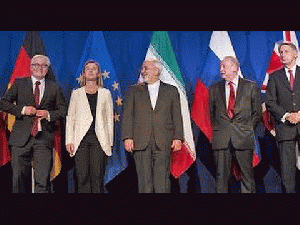Reprinted from Asia Times
This is it. It is indeed historic. And diplomacy eventually wins. In terms of the New Great Game in Eurasia, and the ongoing tectonic shifts reorganizing Eurasia, this is huge: Iran -- supported by Russia and China -- has finally, successfully, called the long, winding 12-year-long Atlanticist bluff on its "nuclear weapons."
And this only happened because the Obama administration needed 1) a lone foreign policy success, and 2) a go at trying to influence at least laterally the onset of the new Eurasia-centered geopolitical order.
So here it is -- the 159-page, as detailed as possible, Joint Comprehensive Plan of Action (JCPOA); the actual P5+1/Iran nuclear deal. As Iranian diplomats have stressed, the JCPOA will be presented to the United Nations Security Council (UNSC), which will then adopt a resolution within 7 to 10 days, making it an official international document.
Iranian Foreign Minister Javad Zarif has described the deal -- significantly -- as a very Chinese "win-win" solution. But not perfect; "I believe this is a historic moment. We are reaching an agreement that is not perfect for anybody but is what we could accomplish. Today could have been the end of hope, but now we are starting a new chapter of hope."
Zarif also had to stress -- correctly -- this was a long-sought solution for an "unnecessary crisis"; the politicization -- essentially by the US -- of a scientific, technical dossier.
Germany's Foreign Minister Steinmeier, for his part, was euphoric; "A historic day! We leave 35 years of speechlessness + more than 12 years of a dangerous conflict behind us."
Looking ahead, Iranian President Hassan Rouhani tweeted now there can be "a focus on shared challenges" -- referring to the real fight that NATO, and Iran, should pursue together; against the fake Caliphate of ISIS/ISIL/Daesh, whose ideological matrix is intolerant Wahhabism and whose attacks are directed against both Shi'ites and westerners.
Right on cue, Russian President Vladimir Putin stressed the deal will contribute to fighting terrorism in the Middle East, not to mention "assisting in strengthening global and regional security, global nuclear non-proliferation" and -- perhaps wishful thinking? -- "the creation in the Middle East of a zone free from weapons of mass destruction."
Russian Foreign Minister Sergey Lavrov stressed the deal "fully corresponds" with Russia's negotiating points. The fact is no deal would have been possible without extensive Russian involvement -- and the Obama administration knows it (but cannot admit it publicly).
The real problem started when Lavrov added that Moscow expects the cancellation of Washington's missile defense plans, after the Iran deal proves that Tehran is not, and won't be, a nuclear "threat."
There's the rub. The Pentagon simply won't cancel an essential part of its Full Spectrum Dominance military doctrine simply because of mere "diplomacy." Every security analyst not blinded by ideology knows that missile defense was never about Iran, but about Russia. The Pentagon's new military review still states -- not by accident -- major Eurasian players Iran, China and Russia as "threats" to U.S. national security.
Now from the brighter side on Iran-Russia relations. Trade is bound to increase, especially in nanotechnology, machinery parts and agriculture. And on the all-pervasive energy front, Iran will indeed compete with Russia in major markets such as Turkey and soon Western Europe, but there's plenty of leeway for Gazprom and the National Iranian Oil Company (NIOC) to coordinate their market share. NIOC executive Mohsen Qamsari advances that Iran will prioritize exporting to Asia, and will try to regain the at least 42% of the European market share that it had before sanctions.
Compared to so many uplifting perspectives, Washington's reaction was quite pedestrian. US President Barack Obama preferred to stress -- correctly -- that every pathway to an Iranian nuclear weapon has been cut off. And he vowed to veto any legislation in the US Congress that blocks the deal. When I was in Vienna last week I had surefire confirmation -- from a European source -- that the Obama administration feels confident it has the votes it needs in Capitol Hill.
And what about all that oil?
(Note: You can view every article as one long page if you sign up as an Advocate Member, or higher).






